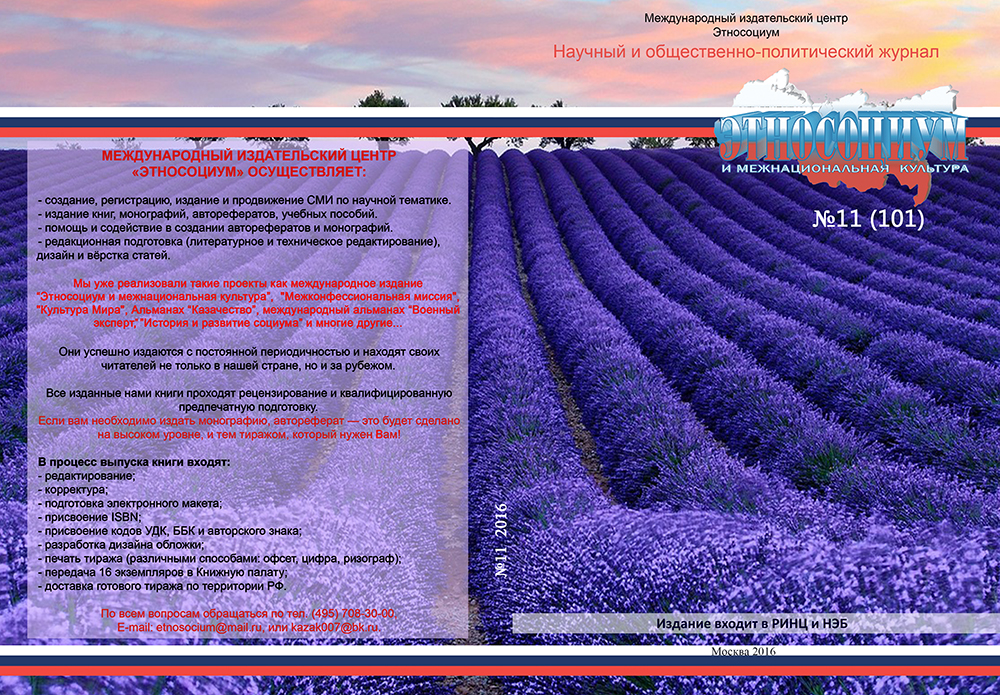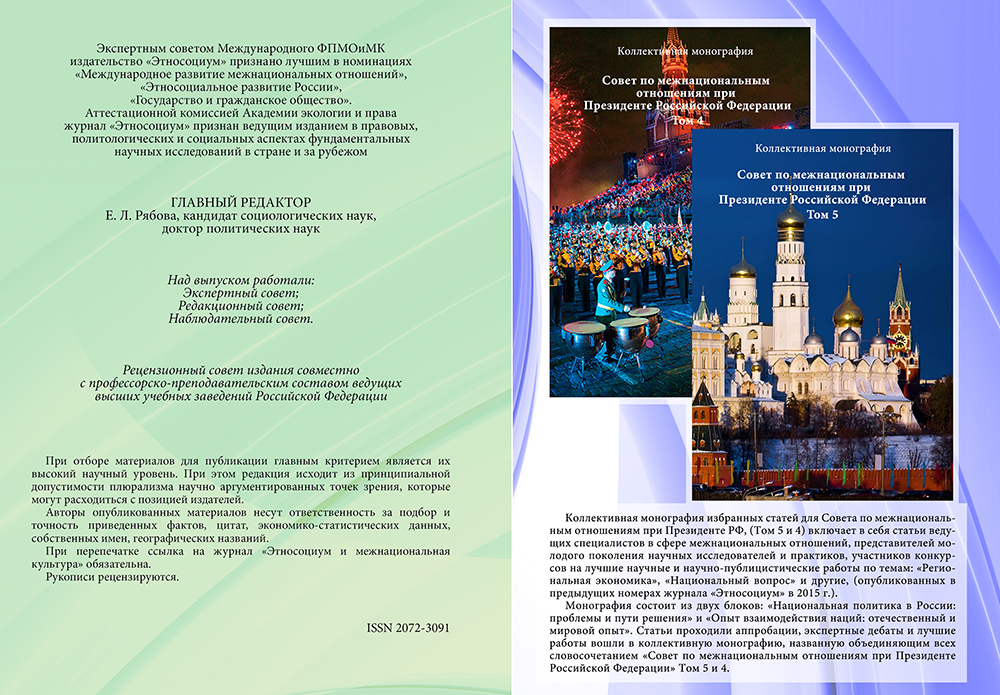

Content
|
COUNCIL OF INTERNATIONAL RELATIONSHIP
|
|
|
Shakhov S.K. Candidate of Political Sciences, Vice-rector of DIRO
|
9
|
|
Bredihin A.V., Ponomarenko B.T. Problem specificity of Indigenous Peoples
|
18
|
|
Kim A.S., Dovgopolov E.J. Russian Ethnopolitology in Terms Of Ethno-Political Conflicts
|
24
|
|
POLITICS, ECONOMICS, LAW:
ACTUAL PROBLEMS OF MODERN SOCIETY
|
|
|
Naumova G.R. The Russian people and their employment preferences
|
37
|
|
Smirnov I.P. Old Belief and zemstvo on materials of fund “Ethnographic Bureau of V.N. Tenishev (1898-1901)”
|
45
|
|
Levkina L.I. Effect of self-organizing “from below” communities in the processes of globalization and modernization
|
55
|
|
Nikashina N.V., Solodovnic Y.V. Implicit antonyms in English language advertising texts
|
75
|
|
Shastina T.V. Performance in the folk song culture: tradition and modernity
|
83
|
|
Yanuskina V.V. Questions of legal codification of the rules of the Russian language as the state language of the Russian Federation
|
91
|
|
POLITICS, ECONOMICS, LAW:
REGIONAL STUDY
|
|
|
Shakhov S.K. Dagestan in the transformation of the geopolitical coalitions in the Caucasian-Caspian region
|
106
|
|
Novak N.A. Background industrial development FOR Sevastopol
|
112
|
|
Andreev A.V. Political resonance in policy: methodology of formation and study, possible strategy of using
|
126
|
|
Pechenegina T.A. The development of public tax culture through the awareness of the mechanism for defending taxpayer rights
|
135
|
|
Gordienko S.D. Integration processes as a control mechanism in the system of inter-regional economic relations
|
143
|
|
Janteeva J.S. Specifics of ethnopolitical media communications
|
155
|
|
INTERNATIONAL RELATIONSHIPS:
POLITICS, ECONOMICS, LAW
|
|
|
Akhinova L.G. Islamic Art in contemporary Paris: another way of integration
|
164
|
|
Mamedov Bayram of Gyulali Oglou Transformation of political system of Turkey in the conditions of globalization
|
171
|
|
Surovtsev S.I. Lobbying activities in the context of its legal regulation: the substantial characteristics and development issues
|
178
|
|
REVIEW
|
|
|
Volkova A.E., Mikhailova N.V. Problem area: synthesis of ideas of Descartes and Kant
|
185
|
|
DISCUSSION
|
|
|
Boltenkova L.F. Do we need the concept of “Russian nation” in the law?
|
189
|
|
Authors
|
197
|
|
Requirements to materials submitted to the international publishing house "Etnosocium"
|
199
|
In the given work the results of critical and analytical review based on the information about historical development of the Russian multi-ethnic state in the forming of the Dagestan ethno-political and ethno-cultural unity in the North Caucasus.
There are given the data on the existing problems in the conducting Russian intercultural policy to ensure the nonconfrontational ethnic interaction.
The basic factors that contribute to inter-ethnic strife and weaken the state, such as voluntary concepts and unbalance of internal policy in the course of evolutionary development of the Caucasus region.
The conclusion is that the solution of the problem is defined in the flexible planning of the national policy of the state on the principles of democracy and federalism.
Keywords: identity, strategy, disorganization, ideology, federalism, innovation, progress.
It is noticed that the problem of preservation and development of ethnic group of Indigenous peoples living in the Russian Federation, is used at times by certain political groups to achieve their selfish goals. As an example, the article analyzed the circumstances of the issue of inclusion in the Unified list of indigenous minorities of Circassians subethnos Ubykhs attempt to consider and which will be made in the article.
Keywords: small, people, Circassians, Ubykhs Ubykhs Circassians, the Caucasus, Turkey.
The authors consider the subject of modern ethno-political science from the perspective of the study of animation of various conditions that determine the interdependence of political and ethnic processes. That is why they have the urgency of developing conflictological aspects of ethno-political research on the background of the intensification of the processes of inter-ethnic tension in Russia today. Under conflictological aspect ethnopolitology means the totality of the problems associated with the study of factors affecting the dynamics of ethno-political conflicts and management. The article analyzes the difficulties in the terminological and methodological development of new phenomena that become the object of research etnopolitologicheskih. The authors identified the source of these difficulties - the contradiction between the need for development and application of new ethno-political management and stagnant, outdated system of theoretical-methodological reflection of modern ethno-political processes. The conclusion is that the heuristic achievements in the field of in-depth understanding of the trends in the development of inter-ethnic relations and ethno-political and migration processes in modern Russia are possible only in the way of the creative achievements of synthesizing Western ethno-political science with the positive elements of the national social science.
Keywords: ethnopolitology, ethno-political conflict potential, ethnopolitical conflict, ethnic group, ethnicity, ethno-political conflict, ethno-political, ethno-politics, national ethnic policy, national, ethnic.
The author determines his position with respect to today's disputes relative to the terminology, connected with the reciprocal effect of the ethnic belonging of citizens RF and their economic preferences. The author supports his observations by historical line of reasoning, drawing analogy between today's state of society and events of age-long remoteness.
Keywords: “Russians”, “Russian people”, the USSR, Russia, social generalities, national generalities, marginalizatsiya, population census is, economic preferences, migration, self-determination.
The article is written on materials of fund "Ethnographic Bureau of V.N. Tenishev (1898-1901)" of Archive of Russian Museum of Ethnography in St. Petersburg. The author selected correspondence which are from stored in archive and describe life and customs of Old Believers peasants from 23 provinces of the Central Russia. Article concludes concerning traditional ways of housekeeping, labor ethics and standards of social behavior of Old Believers' communities reflecting their ethnocultural identity, and concerning system of social and political views of the Russian zemstvo representatives from which there was a bulk of correspondents of ethnographic inspection.
Keywords: Old Belief, zemstvo, ethnography, economy ethics, community, tradition, stereotypes, religious tolerance, ethnocultural identity.
The article presents the peculiarities, dynamics, similarities and differences of the processes of modernization and globalization, the transformation of the democratic foundations in the processes of globalization, modernization and related phenomena. There is the analysis of the transformation of society under the influence of these processes and modern technologies. Shows the results of the researches of the influence of self-organizing "bottom-up" communities, in particular, anti-globalist, to the processes of globalization is given. The author shows some of the features of the process of globalization of Russia.
Keywords: globalization, modernization, the processes of globalization and modernization, the transformation of society, democracy, information, self-organizing "bottom-up" communities, anti-globalist communities, national identity, cross-disciplinary research.
Keywords: implication, implied information, contextual antonyms, binary oppositions.
A significant place in Russian culture is the problem in-depth study of dialect features, to identify the specificity of creativity of folklore performers, who know the secrets of vocal, adopted from their parents. In terms of violations of the diachronic way of broadcast of singing culture, the real importance of the special training of folk singing in the institutions of education and culture.
Keywords: folklore, folk singing culture, regional features, performance, education, training.
Author, based on existing practice and theoretical and legal developments in the field of language rights and the norms of relations justifies the need for codification of the rules of the Russian language at the legal level.
Keywords: Russian language, the language the norm, the rule of law, codification of language norms, the state language of the Russian Federation.
In the work the factors of the transformation processes in the Russian society will be considered. We found out, that in different regions of the Russian Federation they occur in different ways, among others – using either national and ethnical or religious factors. There are given recommendations for promoting the national and international peace and conciliation in the North Caucasus.
Keywords: coalition, paradox, phenomenon, ethnic harmony, substance.
The state of industrial production Sevastopol taking into account peculiarities of the transition period. The interrelation of the problems of the industrial complex preconditions increase production. Recommendations for the revitalization of the industrial facilities of Sevastopol.
Keywords: industry, prerequisite, development, potential, Sevastopol, period of transition.
The article considers the phenomenon of political resonances are considered the technology of their formation, and the specifics of using within the political process. For example, three public awareness campaigns related to the most significant political events of 2011-2012 that changed the course of political developments in Russia and the world.
Keywords: politics, city, methodology, research, process technology.
This work is dedicated to the development of tax culture and tax literacy. It is proved that the goal-oriented development of socio-cultural attitude to taxes in Russia requires the parallel execution of two actions: stuff assistance of the national tax management system, and the dissemination of tax literacy in grass-roots and inoculation of the tax culture.
It is also proven that the public awareness of the necessity of tax remission as an essential obligation shall be combined with the awareness of taxpayer rights. The taxation shall not undermine its own foundation – the business.
Keywords: tax culture, taxes, taxation, tax literacy, tax benefits, tax expenditures.
On the basis of the analysis the author marks out features of ethnopolitical media communications in the North Caucasus, focusing attention that in case of their establishment it is necessary to have knowledge of cultural and identification processes in the region, information and communicative opportunities and ethnic identification of communicants, and also - evolutions of media audience. The opinion is reasoned that the tolerant communicative behavior is a major factor of efficiency of ethnopolitical communications in North Caucasus federal district.
Keywords: ethnopolitical media communications, ethnopolicy mediatization, media impact, evolution of media audience, tolerant communicative behavior, North Caucasus, North Caucasus federal district.
The subject of this article is the review of artistic culture in contemporary Paris. The objects are museums and mass cultural events in the city. The aim of the article is to discover where the Islamic Art is shown and how the state uses culture as an integration tool. To achieve these aims we are going to trace the origin of the Department of Islamic Art in Louvre and review state programs of introduction of the immigrants to the French culture.
Keywords: Paris, Islam, culture, integration, migration.
Dynamics of development of modern political system of Turkey in the conditions of globalization is considered. It represents natural process and infringes on interests of all actors on world political field. Globalization aggravates interstate and interstate problems. The attention to mentality, traditions and interests of the Turkish society is focused. Intra elite contradictions are allocated. Feasibility of finding of supporting frameworks for maintenance in relative balance of political system of Turkey is proved.
Keywords: Turkey, political elite, ruling class, president, coup.
This article explores the formation and development of lobbying institution in Russia and abroad, describes the peculiarities of its regulation. The paper details the legal acts regulating the procedure and methods of lobbying in public authorities, the features of the development of the lobbying legislation in the historical context. Particular attention is paid to the legal basis of lobbying activities, its forms and methods. The author analyzes the prerequisites for the formation of lobbying as a legal institution, establishes its interconnection with other phenomena of political and legal life, explores the problems arising in connection with government relations in the public authorities.
Keywords: lobbying, interest groups, regulation of lobbying activities, lobby, Lobbying Disclosure Act 1995, the United States, parliamentarianism, forms of interest representation.
Reviewing a book containing a new concept of space. It shows that Descartes believed space form of existence of objective reality, and Kant believed a space mode of existence of subjective reality. The authors show that spatial characteristics are inherent in both material and mental objects. Displaying the ratio of the mental and physical space with adequate and inadequate perception.
Keywords: space, mental space, physical space, the law of projection images, primary and secondary qualities.